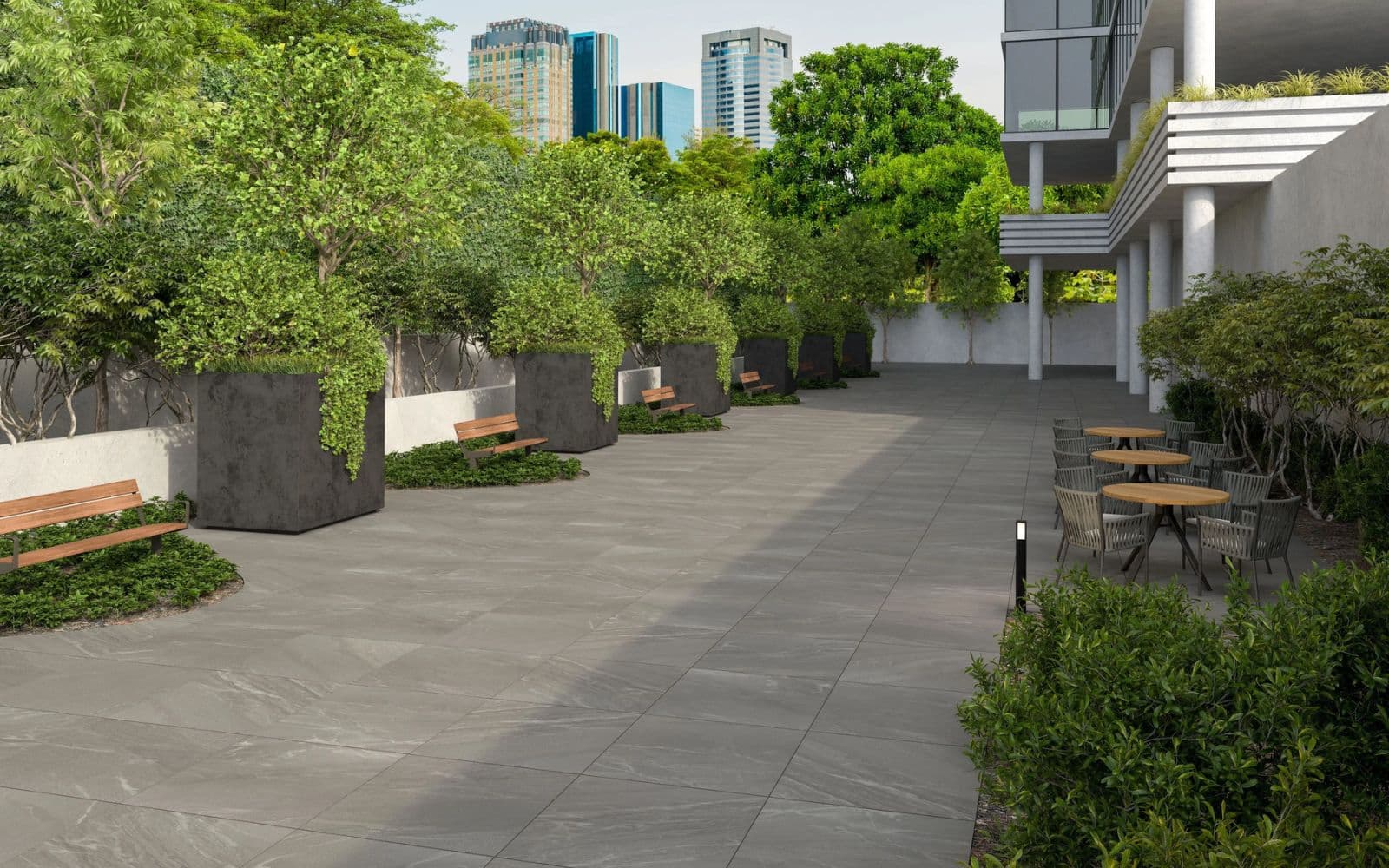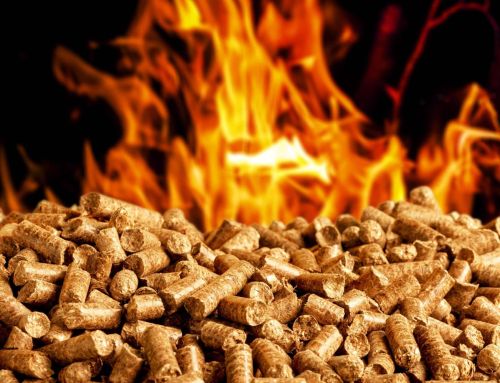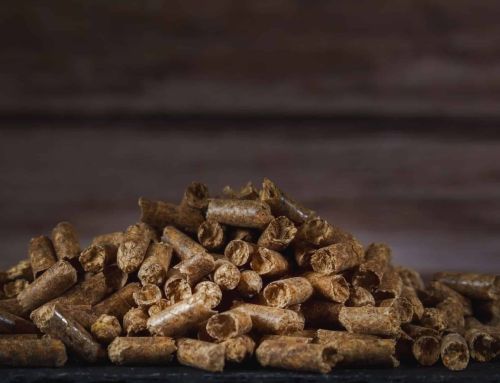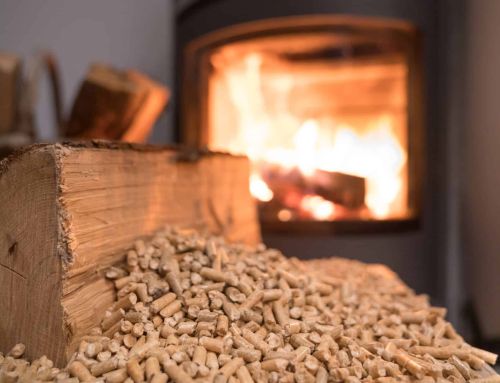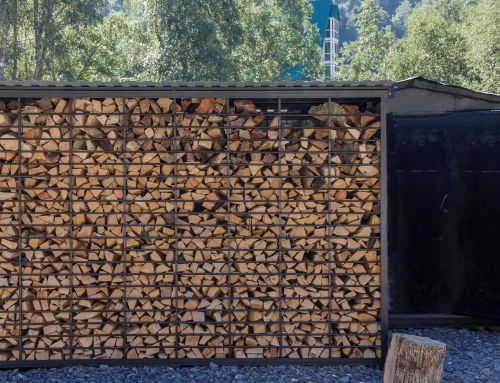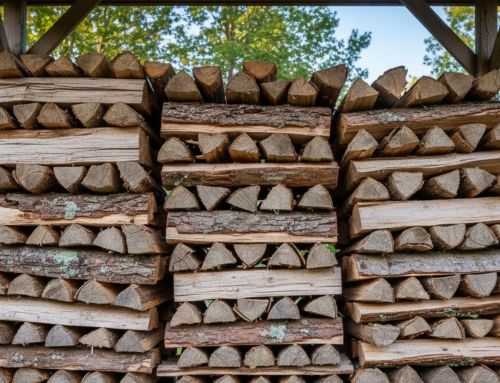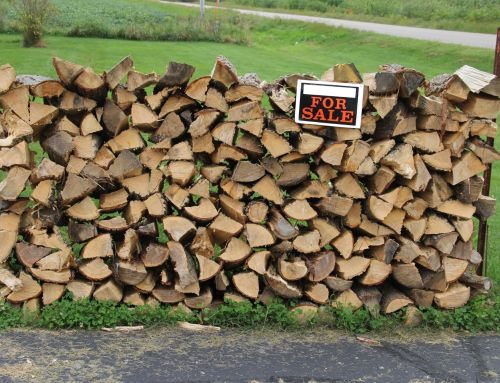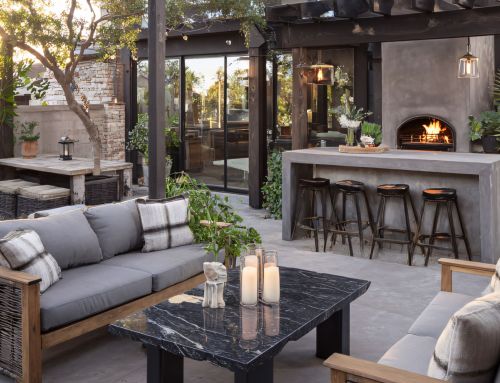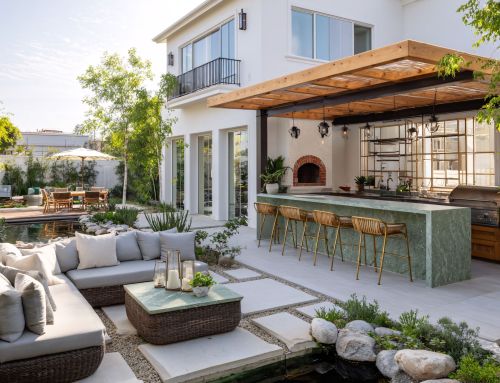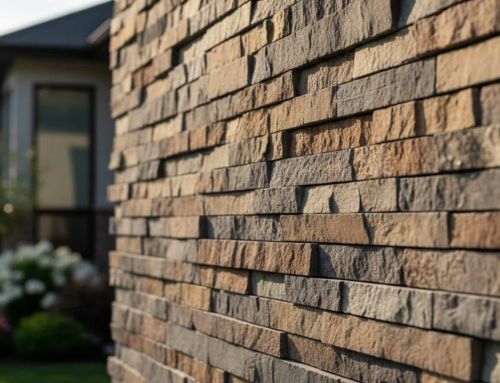When it comes to enhancing your outdoor spaces, choosing the right paving material is crucial for outdoor living spaces. Porcelain patio pavers are quickly becoming the go-to choice for homeowners looking to create stunning, durable, and low-maintenance outdoor living areas. Their exceptional resistance to wear and tear, low maintenance requirements, and aesthetic appeal make them the perfect solution for high-traffic outdoor spaces. These spaces include patios, pool decks, and garden paths.
In this post, we’ll explore everything you need to know about porcelain pavers. This includes their benefits, types, installation tips, and how they compare to other popular paving materials like natural stone and concrete. Whether you’re revamping your backyard, creating a stylish patio, or designing a pool deck, porcelain patio pavers offer a timeless appeal and, durable solution.
What Are Porcelain Patio Pavers?
Porcelain pavers are a type of outdoor tile made from refined clay that’s fired at higher temperatures than traditional ceramic tiles. This process creates a non-porous, highly durable material that can withstand the demands of outdoor applications. Whether used for patios, walkways, pool decks, or garden paths, porcelain pavers provide the perfect blend of style, strength, and low-maintenance care.
Unlike natural stone or concrete, porcelain pavers are much more resistant to environmental factors such as extreme temperatures, intense sunlight, and moisture. Their non-porous nature prevents stains, algae growth, and mildew. This makes them the ideal choice for areas exposed to water, like pool decks and outdoor kitchens, ensuring both safety and aesthetic.
Key Benefits of Porcelain Patio Pavers:
Porcelain patio pavers are an exceptional choice for creating outdoor spaces that are both functional and visually appealing. Below are some of the key benefits that make them stand out as a top choice for patios, pool decks, and other high-traffic areas, giving you a wealth of design options. At Old Station Outdoor & Landscape Supply, we offer a wide variety of porcelain pavers that combine beauty and durability, ensuring your outdoor space lasts for years to come.
- Highly Durable: Porcelain pavers are built to withstand heavy foot traffic. This makes them an excellent choice for high-traffic areas.
- Low Maintenance: Unlike concrete or natural stone, porcelain pavers do not require sealing, and a simple wash with mild soap is enough to keep them looking pristine.
- Frost Resistant: Perfect for climates with cold winters, porcelain pavers are resistant to freezing and thawing, preventing cracking and damage.
- Slip Resistance: Many porcelain pavers feature a textured surface for added safety, particularly around wet areas like pool decks.
- Aesthetic Appeal: Porcelain pavers come in various designs, colors, and finishes, offering flexibility to match any architectural style.
Why Choose Porcelain Pavers Over Other Materials?
When selecting the right paving material for your outdoor space, you may wonder: why choose porcelain over natural stone, concrete, or even recycled materials? Here’s a quick comparison to help you decide.
Porcelain vs. Natural Stone
Natural stone, while charming, is more porous and prone to staining, requiring more maintenance than porcelain pavers. Porcelain pavers are non-porous and highly resistant to stains, mildew, and algae growth. Although slightly more expensive than concrete, porcelain pavers offer better long-term performance and lower maintenance costs. They are a more cost-effective option over time while supporting sustainable practices. Additionally, porcelain provides greater design flexibility with a wide range of colors, textures, and finishes. It allows you to replicate the look of wood, stone, or concrete while enjoying the durability and low-maintenance benefits.
Porcelain vs. Concrete
Concrete pavers often require sealing and can crack over time, particularly in areas with freeze-thaw cycles, whereas porcelain pavers don’t need sealing and are resistant to cracking, offering better long-term durability. Moreover, while concrete tends to have a more industrial look, porcelain can beautifully mimic natural materials like wood and stone. This elevates the aesthetic appeal of your outdoor spaces with elegance and style.
Ideal Uses for Porcelain Patio Pavers
Porcelain pavers are versatile and can be used in a variety of outdoor spaces. Below are the top applications where porcelain pavers shine, including a variety of color options :
Patios
Porcelain pavers are perfect for creating stylish and durable patios. Their ability to withstand intense sunlight, heavy foot traffic, and outdoor weather conditions makes them an ideal choice for outdoor entertainment areas that must withstand heavy foot traffic.
Pool Decks
Porcelain pavers are frost-resistant and slip-resistant, making them a suitable and excellent choice for poolside areas. Their resistance to water absorption ensures that your pool deck remains safe and clean, even during rainy weather.
Driveways
Porcelain pavers can handle the weight of vehicles and are durable enough to be used in driveways. Their non-porous nature prevents stains from oil or dirt, maintaining the surface and visual appeal of your driveway.
Garden Paths
For those looking to add a touch of elegance to their garden or yard, porcelain pavers are the perfect option for different architectural styles. With various designs, you can create a unique pathway that complements the rest of your outdoor space.
Outdoor Kitchens and Walkways
Thanks to their durability and low maintenance, porcelain pavers make an excellent choice for outdoor kitchens and walkways. They’re resistant to heat and won’t fade over time. This secures long-lasting performance in your outdoor cooking area.
How to Install Porcelain Patio Pavers
Installing porcelain pavers is a relatively simple process, especially when compared to more labor-intensive paving materials like natural stone, making installation extremely easy. Below are the key steps for installing porcelain pavers in your outdoor space.
Preparation
Start by assessing the installation area to ensure the ground is level and stable, as you may need to excavate to create a solid base. For optimal results, use a base layer of gravel or sand to promote drainage and secure the porcelain pavers in place.
Laying the Pavers
One of the key benefits of porcelain pavers is that they can be installed dry, without grout or adhesive. Simply lay the pavers on the prepared base, guaranteeing they’re evenly spaced. For a more permanent setup, use a sand or gravel bed to secure them. If needed, you can cut the pavers to fit edges or corners using a diamond blade cutter for clean, precise cuts.
Finishing Touches
Once the porcelain pavers are in place, fill the gaps with sand or gravel to lock them in. Sweep the material into the joints and tamp it down for a secure fit. Although sealing isn’t required, cleaning the pavers after installation ensures a smooth, uniform finish, maintaining their aesthetic appeal and durability.
The Long-Term Performance of Porcelain Pavers
Porcelain pavers are known for their long-term performance, even in high-traffic outdoor areas. Unlike natural stone or concrete, they are resistant to cracks, stains, and discoloration. This makes them an ideal choice for durable, long-lasting outdoor applications. Their non-porous nature means they don’t absorb liquids like concrete or natural stone, which keeps them resistant to stains from oil, food, and other outdoor spills.
Furthermore, porcelain pavers won’t fade over time due to prolonged exposure to sunlight, keeping them perfect for areas like patios and pool decks that receive plenty of direct sunlight. With minimal maintenance required, a simple wash with mild soap is all that’s needed to maintain their original luster, while concrete pavers require resealing. Porcelain pavers offer an excellent, low-maintenance solution that stands the test of time.
Conclusion
Porcelain patio pavers offer the perfect combination of durability, aesthetic appeal, and low maintenance for any outdoor space. Whether you’re upgrading your patio, creating a pool deck, or designing a new garden path, porcelain pavers provide a stylish and practical solution that will last for years to come, catering to your design preferences.
At Old Station Outdoor & Landscape Supply, our team is here to help you choose the right porcelain pavers for your needs and guide you through the installation process. Contact us today to explore our wide selection of high-quality porcelain pavers and transform your outdoor space into a stunning and durable outdoor living area. Let us help you create the outdoor living space you’ve always dreamed of!
FAQs
Are porcelain pavers good for a patio?
Yes, porcelain pavers are an excellent choice for patios due to their durability, aesthetic appeal, and low maintenance. They are resistant to stains, cracks, and discoloration, making them ideal for high-traffic outdoor spaces. Additionally, they offer slip resistance, which is especially important for wet areas like poolside patios.
How much does a porcelain paver patio cost?
The cost of a porcelain paver patio can vary depending on the size, design, and manufacturer. On average, porcelain pavers cost more than concrete but offer better long-term performance and reduced maintenance costs. Expect to pay a premium for the durability and aesthetic appeal they provide.
Are porcelain pavers cheaper than concrete?
While porcelain pavers are generally more expensive than concrete, they offer better durability and require less maintenance. Concrete pavers often need sealing and may crack over time, which can add to long-term costs. Porcelain pavers, on the other hand, provide a more cost-effective solution in the long run due to their low maintenance and long-lasting performance.
Can porcelain pavers be installed over concrete?
Yes, porcelain pavers can be installed over existing concrete surfaces. This is a great option if you want to avoid removing and replacing old concrete, and it can save on installation costs. The pavers can be laid directly over the concrete with a proper base layer to ensure a stable and secure fit.

